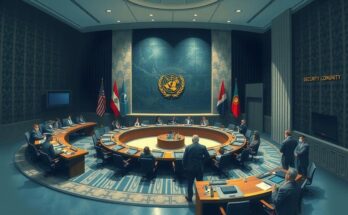The Spring 2025 issue of Middle East Quarterly discusses crucial topics such as Iran’s nuclear ambitions, Hamas’s propaganda tactics, Egypt’s economic challenges, and changes in Biden’s approach to Israel. It includes important book reviews that analyze authoritarianism and radical ideologies, providing comprehensive insights into the current state of the Middle East.
The Spring 2025 edition of the Middle East Quarterly arrives during a pivotal time, featuring incisive analyses of pressing issues in the Middle East. Topics include a call for decisive action against Iran’s nuclear ambitions, an exploration of Hamas’s propaganda during the Gaza War, Egypt’s economic struggles, and the evolving stance of former President Biden on Israel. The issue also reviews two notable books that discuss the impacts of authoritarianism and jihadism on regional stability.
Colin Winston, a veteran intelligence operative, advocates for immediate military action against Iran’s nuclear capabilities. He suggests a coordinated strike by U.S. and Israeli forces, emphasizing Iran’s precarious state post-Israel’s interventions. Winston warns that the country is close to producing weapons-grade uranium, making a military response not only timely but crucial, as reliance on intelligence warnings is increasingly uncertain.
Andrew Fox and Tania Glezer provide insight into Hamas’s effective propaganda strategies during the Gaza War. Their analysis highlights the distortion of narratives focusing on civilian suffering which obscures Hamas’s role in the conflict. They note that Israel maintains one of the lowest civilian-to-combatant casualty ratios in modern warfare, comparing current statistics to past conflicts to underline this point.
In a separate piece, Egyptian economist Nael Shama underscores Egypt’s economic vulnerabilities, noting that reliance on foreign aid could perpetuate its crisis conditions. Shama calls for systemic changes to enable Egypt to stabilize economically and autonomously, moving beyond a cycle dependent on external financial support to achieve sustainable growth.
Political analyst Daniel Samet reviews the shifting perspectives of former President Joe Biden regarding Israel. Once a staunch ally, Biden’s gradual critique reflects changing dynamics within the Democratic Party, particularly in response to new political sentiments during the Gaza conflict. He emphasizes Biden’s adaptive nature to meet contemporary political landscapes while navigating his historical support for Israel.
In book reviews, Eyal Zisser examines Con Coughlin’s work, “Assad: The Triumph of Tyranny,” praising its narrative despite the challenges faced in contemporary historical writing. Meanwhile, Anna Stanley reviews “The British Suicide: The U.K.’s Self-Inflicted Failure to Defeat Jihad for Two Decades,” applauding its in-depth research on the U.K.’s struggles against extremism and the failures that have allowed radical ideologies to thrive.
The Middle East Forum serves to advance American interests in the region and to shield Western civilization from Islamic extremism through innovative ideas and targeted activism. For further inquiries, individuals may refer to www.meforum.org.
The Spring 2025 issue of the Middle East Quarterly presents critical analyses pertinent to contemporary Middle Eastern dynamics, particularly concerning Iran’s nuclear trajectory, media narratives in conflict, Egypt’s economic instability, and shifts in U.S. political stances regarding Israel. The accompanying book reviews further highlight the complexities surrounding authoritarianism and extremist ideologies influencing the region. Ultimately, the edition serves as a valuable resource for understanding the evolving landscape of the Middle East.
Original Source: www.meforum.org




